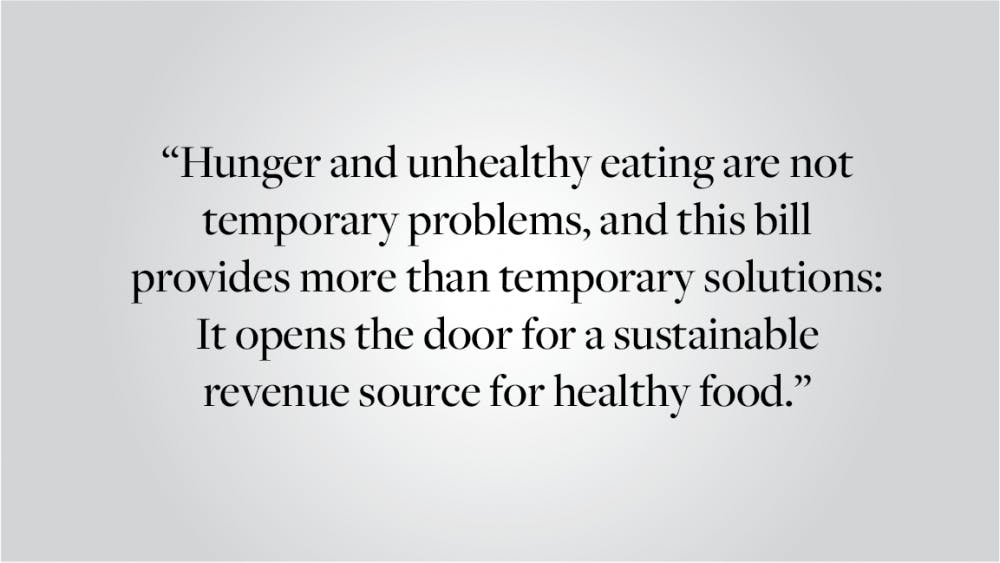The COVID-19 pandemic has deeply harmed Rhode Island’s economy and a quarter of households are now experiencing hunger. Even as businesses start to reopen, an unprecedented number of Rhode Islanders still rely on food banks to feed themselves and their families, and food bank usage grew by 26 percent in the past year. Despite these dire circumstances, Rhode Island’s legislature now has the opportunity to alleviate hunger and institute a long-term commitment to improving food access.
Recently, the Rhode Island House and Senate proposed a sustainable program to alleviate hunger. Through a bill introduced by State Representative Jean Philippe Barros and State Senator Valarie Lawson, the legislature is considering implementing a nominal 1.5 cent per ounce tax on distributors of sugary drinks that would fund a 50 percent discount on fresh fruits and vegetables for Supplemental Nutrition Assistance Program recipients at grocery stores across the state. This initiative is referred to as the Retail SNAP Incentive Program.
I began supporting this legislation while enrolled in PHP 1820: “Designing Education for Better Prisoner and Community Health,” as a member of a project team working to identify and reduce barriers to healthy eating for formerly incarcerated individuals. I was inspired to take action after talking to families and learning about their struggles to purchase healthy food for themselves and their children. Across three focus groups of formerly incarcerated mothers, more than 40 percent of participants reported having skipped a meal in the past year after running out of SNAP dollars. Further, several women told stories of times that they had gone hungry to feed their children. During the focus groups, I heard over and over again that participants wanted to eat healthier, but could not afford to buy fresh fruits and vegetables for their families despite receiving SNAP. Critically, every single focus group participant supported the RSIP.
Those participants’ experiences are not anomalous. According to the Center on Budget and Policy Priorities, more than half of SNAP recipients report running out of benefits within the first two weeks of the month, and a quarter exhaust their benefits in less than a week. Not only would the RSIP help SNAP beneficiaries stretch their food budgets over longer periods of time, it would also incentivize the purchase of healthy foods. The bill would subsequently increase recipients’ purchasing power, granting them the autonomy to purchase healthier food options for themselves and their children.
The bill not only reduces the largest barrier to healthy eating — cost — but sugary drink taxes have proven to be effective in other cities that have implemented them. For example, in Berkeley, California, after a sugary beverage tax was enacted, soda sales declined by 9.6 percent while water consumption increased by 15.6 percent. The average consumer’s grocery bill did not go up, nor did grocers’ revenues decline.
The research I performed this semester made one fact clear: The most affordable food options are high in calories and low in nutrients. Relying on unhealthy foods contributes to a host of chronic diseases, including diabetes, hypertension, heart disease and depression. According to a report from the Children’s HealthWatch, children who experience malnutrition before the age of 10 are disproportionately likely to develop irreparable cognitive and developmental disorders. Hunger and unhealthy eating are not temporary problems, and this bill provides more than temporary solutions: It opens the door for a sustainable revenue source for healthy food purchases.
Rhode Island’s Beverage Association claims that now is the wrong time to consider this legislation. However, an unprecedented number of families do not have enough money to put food on the table as a result of an economic downturn that could last for years. Passing this legislation is critical. Beyond easing the burden of the pandemic, this bill is our chance to mitigate hunger and improve access to healthy food options for years to come.
The bill proposes a public policy designed to increase healthy eating, decrease the consumption of sugary drinks and make fresh fruits and vegetables affordable for SNAP recipients. In doing so, the legislation would maximize the impact of taxpayer money spent on food assistance programs while concurrently reducing chronic disease risk, a major catalyst for health expenditures.
The past year has exposed critical shortcomings in how we address food security. The way we respond to the challenges of the COVID-19 pandemic are crucial in determining how we can better the health of Rhode Island residents in the long run. Through bold legislative action, Rhode Island can become a national leader in healthy food access.
Claire Hodges ’22 can be reached at claire_hodges@brown.edu. Please send responses to this opinion to letters@browndailyherald.com and other op-eds to opinions@browndailyherald.com.

ADVERTISEMENT




